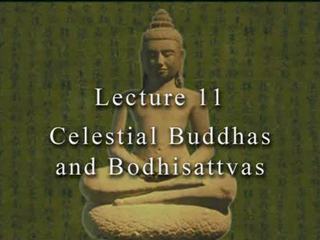The eleventh and twelfth lectures by Prof David Eckel on Buddhism look at the various Bodhisattvas and divine beings, and the doctrine of emptiness in Mahayana Buddhism.
Course Notes:

Along with the human beings who aspired to the bodhisattva ideal came an array of heavenly beings called “celestial” Buddhas and bodhisattvas, who had accumulated the wisdom and compassion to save living beings who turned to them for help.
Among the many important celestial bodhisattvas is Avalokiteshvara, the “Lord Who Looks Down” with compassion. In China, Avalokiteshvara is worshipped as the compassionate deity Kuan-yin. In Tibet, Avalokiteshvara’s compassion is seen in the figure of the Dalai Lama.
The best known celestial Buddha is Amitabha, the Buddha of Infinite Light. According to tradition, Amitabha resides in a celestial paradise known as the Pure Land, and Amitabha has vowed to save anyone who chants his name with faith. Devotion to Amitabha has had great influence in China and is now one of the most popular forms of Buddhism in Japan.
if the video does not appear on the page, try reloading the page; and if that doesn’t work, leave a comment so I can update the page (the comment is not published)
Course Notes:

At the heart of Mahayana practice lies the paradoxical and elusive concept of Emptiness. When they speak about the nature of reality, Mahayana texts claim that nothing exists in its own right. They say, in other words, that everything is “empty” of identity. Like many Buddhist concepts, Emptiness seems at first to be very negative, but the Mahayana tradition claims that it is exactly the opposite.
Mahayana texts insist that “everything is possible for someone for whom Emptiness is possible.” To understand how this can be true, we need to consider the doctrine of two truths. While it may be true that nothing exists in its own right from the ultimate point of view, it is possible to take the ordinary categories of life seriously in a provisional or conventional way. Learning to distinguish between the ultimate and conventional perspectives is one of the most important and liberating skills in the practice of the Mahayana.
if the video does not appear on the page, try reloading the page; and if that doesn’t work, leave a comment so I can update the page (the comment is not published)
to see an album of screenshots click here


Thanks for your posts. I love them so much. Look forward to the next episodes in David Eckel: Buddhism lecture soon